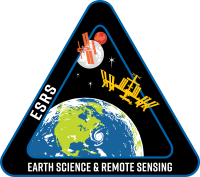Night Lights of the Levant
This photograph, taken from the International Space Station (ISS), shows the sweep of the coastline of the eastern Mediterranean Sea. The cluster of lights at image center includes the major population centers of the Levant. The brightest lights are the cities of Tel Aviv in Israel, Amman in Jordan, and Beirut in Lebanon.
Other light clusters include the Nile Delta in Egypt, and a nearby thin string of lights revealing the Suez Canal. The more scattered lights of the Turkish coastline and the country’s mountainous interior arc from top left to top center.
Populations are small in the deserts of the Middle East, so few lights appear in vast portions of Saudi Arabia (right), Syria (top center) and Iraq (top right). The largest population centers cluster where water is available, especially along the great rivers of the region, the Tigris and Euphrates. In Iraq, the capital city Baghdad stands as the brightest spot where these rivers meet.
Images such as this also show the hints of conflict. In Syria, darkness now reigns along a 300-kilometer stretch where lights use to line the Euphrates River in the east of the country. This has left most of eastern Syria in the dark.
Related Images
- NASA Earth Observatory (2017, May 16) Night Lights Change in the Middle East.
- NASA Earth Observatory (2014, August 18) Eastern Mediterranean Coastline at Night.
- NASA Earth Observatory (2010, November 8) Nile River Delta at Night.
Astronaut photograph ISS053-E-50422 was acquired on September 28, 2017, with a Nikon D4 digital camera using a 24 millimeter lens, and is provided by the ISS Crew Earth Observations Facility and the Earth Science and Remote Sensing Unit, Johnson Space Center. The image was taken by a member of the Expedition 53 crew. The image has been cropped and enhanced to improve contrast, and lens artifacts have been removed. The International Space Station Program supports the laboratory as part of the ISS National Lab to help astronauts take pictures of Earth that will be of the greatest value to scientists and the public, and to make those images freely available on the Internet. Additional images taken by astronauts and cosmonauts can be viewed at the NASA/JSC Gateway to Astronaut Photography of Earth. Caption by Justin Wilkinson, Texas State University, JETS Contract at NASA-JSC.

